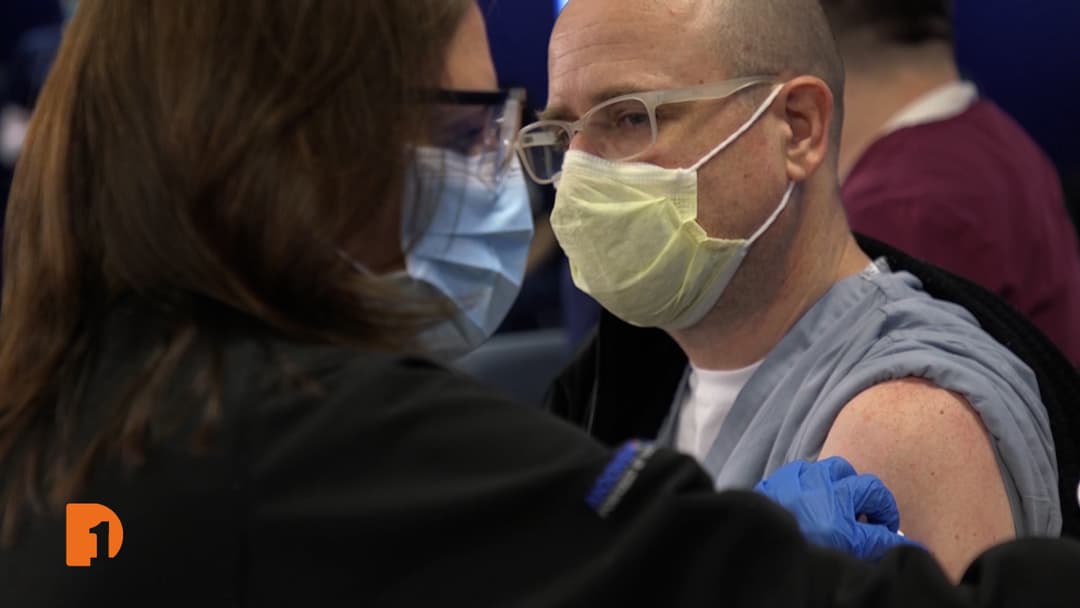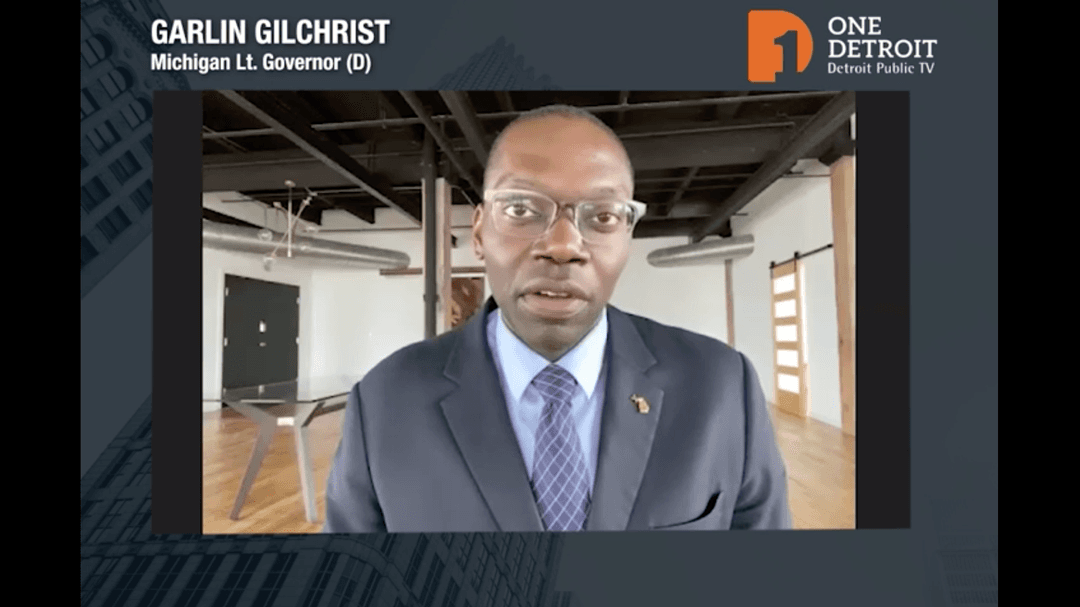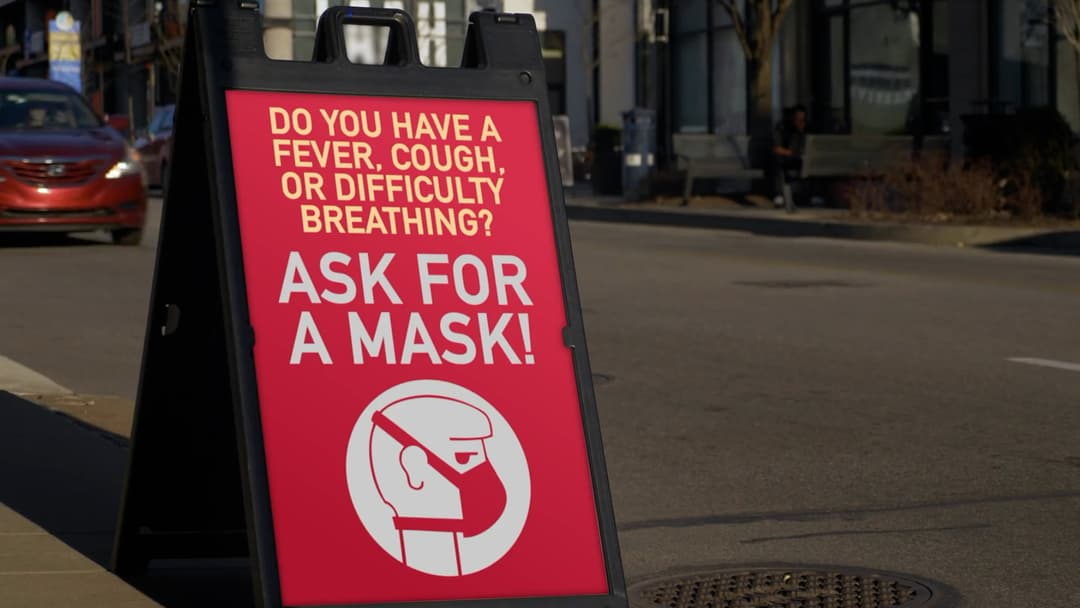Why are Michigan’s COVID numbers so high?
Apr 8, 2021
COVID cases in Michigan are surging. Virologist Dr. Oveta Fuller from the University of Michigan talks with Christy McDonald about what’s brought on Michigan’s latest COVID wave, the effectiveness of the vaccines, and the factors behind making vaccines available to kids 12-15.
Read full transcript
Christy McDonald With me now is associate professor of microbiology and immunology at the University of Michigan Medical School, Dr. Oveta Fuller. Dr. Fuller, it’s good to see you. And what a week that we’re dealing with. We see the numbers in Michigan, we’re leading the country 7 day average of 15.5 percent. And people are saying, what’s going on? Can you explain this?
Dr. Oveta Fuller, Associate Professor of Microbiology and Immunology, University of Michigan Medical School Yes, I wish I could explain this. It’s pretty amazing. What I think is happening is that we are in the midst of several things. One, it’s springtime, and so there are a lot more people we’re engaging with one another. We’re just outside and we’re interacting more. It’s spring break for our children. Some of our college students have come back from the day or so spring break. So there’s a lot of social engagements. Even while we’re still getting more people vaccinated, but we’re not all vaccinated yet. And then most importantly, in Michigan, we have the B.1.1.7 variant, which is the Great Britain variant that we know is much more transmissible. So I think if if we didn’t have any one of those, if we if we didn’t have the variant, we’d be in a much better, we’d see less infections. If we didn’t have the springtime and the interactions that we’re seeing, we’d be in a much better place because the vaccinations really are making a difference. But when you put those things together, I think we just see a lot of new infections that are occurring. Fortunately, we know how to handle COVID a little bit better. So I don’t think the death rates are going to be as high, but the infections are definitely there.
Christy McDonald And it’s baffling for a lot of people who said, “Gosh, Michigan locked down one of the most of any states in the country and we did everything right.” And so they’re talking about this this this really this perfect storm. But are we handling it better now? Or is it just the restrictions are are stopping and and people are living the way that they want?
Dr. Oveta Fuller I think we’re handling it better. And I think we are all so tired of COVID restricting our lives. It isn’t so much the government as it’s just that, you know, I, we had a pop up clinic, vaccine clinic at our church this past weekend, and it was just so good to see people in person, even though everybody was masked, even though we were distance, it was so easy to stand by someone and talk. I mean, you realize, oh, wait a minute, I need to step back, because you haven’t seen people in a while. So I think we’re all caught in this and we really now have to keep our guard up in an amazing way because we’re so close to being in a position where we can break the back of this pandemic and get it under control and get the positive test below 5 percent or even down to 3 percent. But we’re just not there yet. So it’s so easy, you know, it’s a beautiful spring and you want to get together with people, but not we’re dealing with a vaccine, a virus that is much more transmittable right now
Christy McDonald Let’s talk about the vaccines and your experience, you said at your church of the vaccine clinic. We know that people are now more opt to get the vaccine. Looking across the country, there are 40 percent of adults in America that have had at least one shot, right now over over 100 million. What are you seeing in terms of people wanting to get vaccinated and the ease and ability for them to get vaccinated now?
Dr. Oveta Fuller Well, in Michigan, I am really happy to say that the government and both the state as well as the county governments and health departments, are making such an effort to move the vaccines into the place where we have the highest COVID cases, and to make that access, not a barrier. So I know in the Ypsilanti, Ann Arbor area, there have been lots of opportunities for people who want to get vaccinated to do so. We had something like 240 vaccines available yesterday and we had 240 people take vaccines. And so that was just it was just such a rainbow of people. It was wonderful to see that. So I think that Michigan is to be applauded both for its early control of COVID-19 and coronavirus and even now for what it’s doing. Again, I think we’re seeing the high rate because we got B.1.1.7 very early back in January, and it came back. It came here in a in in a way that would allow it easily to spread among young adults who might have been asymptomatically infected and didn’t know they were infected. And so that just gave the virus an opportunity to sort of fly under the radar before we knew. And I think that’s we’re coming out of winter, right? We want to be together. There’s been good uptake in many places, people who are on the fence are moving toward, I will get the vaccine. People who were saying, “I won’t get the vaccine”, are still not getting the vaccine.
Christy McDonald How about the effectiveness of the vaccine? Are you pleased with what you are seeing so far?
Dr. Oveta Fuller I am comforted by what I see, and that is that the data going back to CDC from the V-safe, which everybody is asked to sign up for when they get a vaccine, is showing that the side effects of what was predicted from the clinical trials. Yes, the second time the second injection brings greater side effects. But that’s because the immune system is working and you’re seeing now the antigen that you are responding to. So that means your body saying, “Oh, I’ve seen this before, let’s go into battle.” And that’s what the side effects are. They’re the body’s response to what it’s been stimulated to respond against. So that’s good. So I think what we’re seeing is what we had hoped would happen. There have been no great adverse events, or severe adverse events where people have unforeseen things that happen. There have been some deaths, of course, from people who got vaccinated, but that has not been related to cause by the vaccine. If you have millions or hundreds of thousands of people, some people are going to die. It might be after the vaccine, but that is not the cause. And so we’re not seeing that in any way that says it’s related unduly to vaccination. So I’m really pleased with. We’re making progress, we’ve got a long way to go, and if there’s anything I would ask people to do is just to keep using those public health preventions that we know work. Keeping away from other people, physically distance, be outside and be a part, wear your mask when you’re around people not from your household, If you’re gathering, make sure you’re gathering at people who are fully vaccinated. I know a couple of cases where people got the first vaccine and within the 10 days of getting vaccinated came down with COVID and they go “What happened?” And then they’ll tell me what they did was like, well, you know, if you were at a, you were a DJ or you were at an event with 200 people and even though you had a mask and some of those people didn’t have a mask, you only had two vaccine for 10 days. Well, you know what? You got exposed to a lot of virus and the fact that you’ve got mild to moderate COVID, but you didn’t have to go to the hospital, says that your your immune system at least was on your side. So we can’t stop doing the things that we know work.
Christy McDonald I want to look at the next stage of vaccinations because they’re looking at the numbers of young people who they believe are spreading covid right now at this time. And we know that that Pfizer came out and said, “We think that we have some really good research and numbers from the clinical trial for the 12 to 15 year old’s.” You were very vocal about posting that “No for Pfizer” initially under the emergency use. What do you think the FDA, CDC, they’ve learned since then that they should be looking at now if they go to give a green light to Pfizer and Moderna somewhere down the road to start giving it to younger patients?
Dr. Oveta Fuller Yes, whenever we look at medicines or vaccines for younger people, they’re not little adults, right? So there are things that have to be considered. And that’s what actually is happening now with the clinical trials for 16 and below and then even younger children. And so I think the things that are happening is, is to realize that right now we have vaccines that are available for 16 and older if they’re if it’s Pfizer and 18 and older with the others. And our young adults and young people need to understand that even though and now we’re seeing more of them getting COVID, getting COVID symptoms. But even if they don’t get sick, that they can be infected and move the virus, make more virus, which means there’s more opportunity for variants to arrive, which could get around the vaccines that we currently have, as well as more opportunity to get it to more people who may actually get sick. So young people and I think young people are pretty responsible, they are they are young right now, so therefore, the precautions that maybe we as adults, more seasoned adults can do, they don’t have. Their more spontaneous; they tend to forget, oh, I’m not supposed to be doing this, but I think if we really press upon them that they are part of the solution, that they have the responsibility of doing what we know and reminding others, their peers and others that, oh, yeah, we shouldn’t probably get together on the basketball court, or, Oh, yeah, we’re walking down the street and talking but your mask just slip, would you kindly put it back up, or, Yeah, we’re going to gather for a, we want to gather for somebody’s birthday or somebody’s wedding shower, but let’s do it virtually. because really it’s not safe for 20 people to get together right now if their not vaccinated, Right? So I think I think if we help, if we count on them to do that sort of thing, even as we’re looking at moving the vaccine now down to 16 and older and hopefully by the end of the summer to even younger than 16, that they will come aboard. Meanwhile, adults need to be the ones who are adults in the room, if you know what I mean. We need to be the ones to say, “I’m going to do everything I can, including following the conventions as well as getting vaccinated.”
Christy McDonald What will be written about this? and I know people are the story keeps changing with COVID. But from your perspective, what will we take in this this chapter of this pandemic?
Dr. Oveta Fuller What I am hearing is that it’s not over till it’s over. That, you can see the light at the end of the tunnel, but if you don’t take the same precautions and same care to do what’s necessary to keep moving forward, then the light at the end of the tunnel may just be visible, but you’re not making progress to get there. And so what do I mean by that? We know what to do. We do know what to do, at least with the original virus that we had. We are in a situation where the virus is just simply trying to survive. In order to do that, if there’s a change in its in its genetic makeup that makes it more fit to reproduce itself, it’s going to take that because that’s just how it is. We, on the other hand, are trying to shut down the ability of this virus to infect us and cause disease. So, we have to do what we know to do, just like the virus is definitely going to do what it knows to do. And so, it’s a matter of whether we have the willpower collectively to work together to do those things we all need to do. Because if I do it and somebody else doesn’t, or you do it and I don’t do it, then we’re not we’re not making the progress we need to make that we could make if we we did it together. And it’s hard because we’re just we’re just social people.
Christy McDonald Explain to people again, even if they get vaccinated, why they should wear a mask.
Dr. Oveta Fuller Yes. So vaccinated people who are fully vaccinated can get together with other fully vaccinated people only without a mask. Because nobody should be infectable, even if some of us may be shedding virus. You can we don’t know yet if you don’t get infected, we just know you don’t get sick with the vaccine. But if there is any possibility of people around you, even if you go back home to someone who’s unvaccinated, then you should not be in those situations without a mask. So we wear masks, one, to make sure that if I’m putting out virus, I’m not putting it into the environment for someone else to take up, particularly someone who is not immunized, be they with COVID haven’t had covid or be they haven’t had a vaccine. And also for me, I think modeling what everybody needs to do. And everybody at this point needs to be aware of wearing masks and keeping distance until we can all safely not do it. To me, that’s also just as important because you do what you see others do or you forget to do. If I don’t have to wear one and we’re on this conversation that maybe yours will slip down and nobody will notice. So I think we have to really be vigilant until we are able to say the virus positive test for the virus are below that 5 percent level, that’s so important.
Christy McDonald So that’s the number to look for, not the, what would the herd immunity percentage be. It’s the number of positive tests percentage wise?
Dr. Oveta Fuller What this is, this is my thought is, yes. The number of positive test tells you how much virus is circulating in the community in a relative basis based on who or how many people are coming back positive. So whether you have immunized people or not, that is the ultimate thing that’s going to determine how many people get infected. Along with things like how many people are vaccinated. But to me, even if we’re all vaccinated, we don’t really yet know how long it lasts, right? So what if if I got vaccinated in December and it lasts 8 months and now I’m into my ninth month? Well. Having the herd immunity is less sure than saying the level of infection or level of circulating virus is below five percent or 3 percent positive test. So that means there’s not much virus out there, so I’m good to go, as long as I don’t hug someone and, you know, as long as I’m not in a room with someone close up for 5 hours who has coronavirus. So I think that’s a safe thing that we if we get used to that, that will take us through past the pandemic into coexisting with with with coronavirus, because I think that’s what’s going to happen. We’ll know then that this is almost like the pollen level, right? So, you know, if you if you have allergies, the pollen that there’s certain times the pollen level is really high, so you do this. Well there’s certain levels, the coronavirus circulating level in this region, in this area is really high, so we need to do our mask, and we need to not have gathering above 10 people or we need to do this. Oh, but now it’s back down to 2 percent. OK, we can get together because there’s no circulating virus, but there’s little circulating virus. And if somebody is testing positive, we can do the contact tracing isolation and control it that way. So that, I think, would help people to realize we can coexist managing coronavirus like we manage influenza, or we manage other things. And that’s what we want to get to.
Christy McDonald Dr. Fuller. Thank you so much for explaining all of this to us and to our viewers. It’s it’s it’s so valuable. So thank you so much for your time.
Dr. Oveta Fuller You’re welcome.
Stay Connected
Subscribe to One Detroit’s YouTube Channel.
Catch the daily conversations on our website, Facebook, Twitter, and Instagram @detroitperforms
Related Posts
Leave a Reply
Your email address will not be published. Required fields are marked*




























